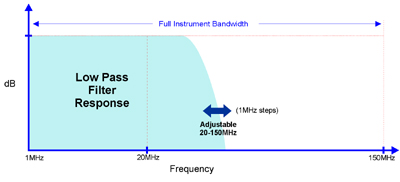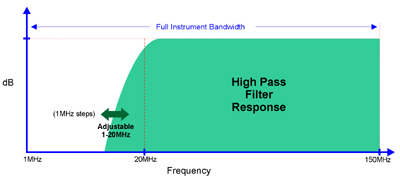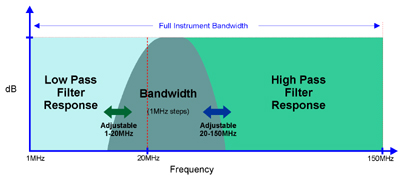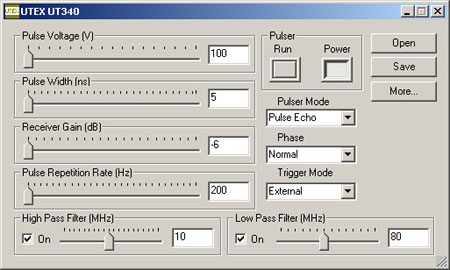|
Description
The UT340 Option - 002
filter module provides continuously variable second order low-pass
and high-pass filtering as well as selectable RF signal inversion.
It can be specified as an option for new UT340 pulser receivers
or it can be retrofitted into existing UT340 instruments. The module
works equally well with UT320 instruments.
Continuously
variable filters offer many benefits that switchable filters cannot
provide. The most important benefit is the precise positioning of
the filter. The problem of being too far away or too close to the
transducer center frequency is eliminated. The filters can slide
from both sides in 1MHz steps.
The low-pass
filter is primarily used for broadband noise reduction where the
full 150MHz bandwidth of the UT340 is not required. Its very broad
range (20-150MHz), makes it useful as a precision attenuator for
downshifting/attenuation studies.
The high-pass
filter is useful for increasing spatial resolution when using broadband
ultrasonic transducers. It can also dramatically decrease amplifier
recovery time, allowing ultrasonic work much closer to the main-bang
pulse.
The invert function
is useful for realigning maximum RF cycles for peak detection or
for comparison after interface inversions.
Benefits
Low-Pass
- noise reduction
- can be used
as a frequency-based attenuator

High-Pass
- increased
spatial resolution
- decreased
amplifier recovery time
- allows work
closer to main-bang pulse
- provides
broadband transducer frequency up-shifting capability

Bandpass
- place filter
skirts around transducer center frequency to reduce unwanted signals
- match frequency
response of UT3xx to the passband of other instruments
- provides
ultra-flat and ripple-free response in the passband region

Computer
Control
- all filter
and invert functions can be controlled by a remote computer
- settings
can be saved and recalled from the instrument front panel
- settings
can be saved and recalled from the remote computer

Specifications
| Low-Pass
Filter |
Specification |
| Frequency
Range |
20
MHz-150 MHz |
| Cutoff
Slope |
12
dB/octave |
| Passband
Ripple |
none
|
| Insertion
Loss |
0
dB |
| Filter
Bypass? |
Yes
|
| High-Pass
Filter
|
Specification |
| Frequency
Range |
1
MHz-20 MHz |
| Cutoff
Slope |
12
dB/octave |
| Passband
Ripple |
none |
| Insertion
Loss |
0
dB |
| Filter
Bypass? |
Yes |
|







